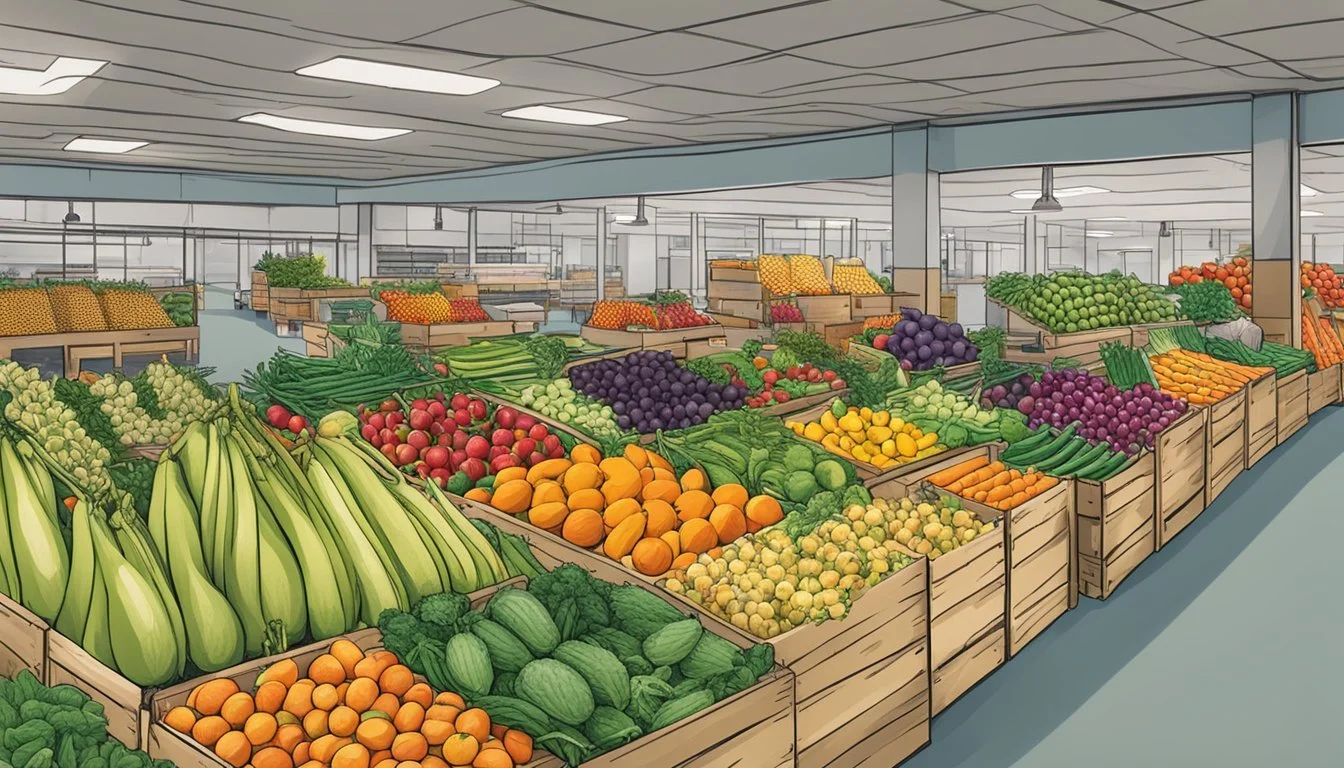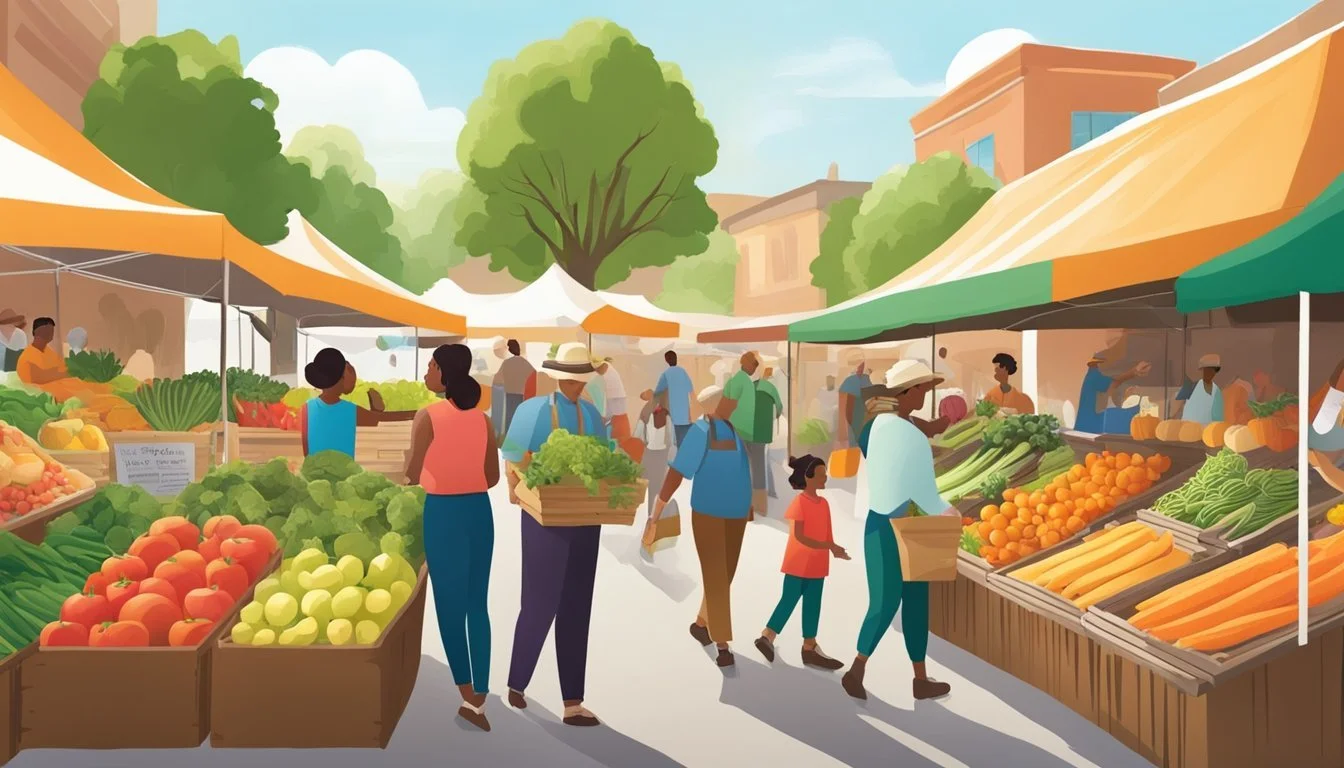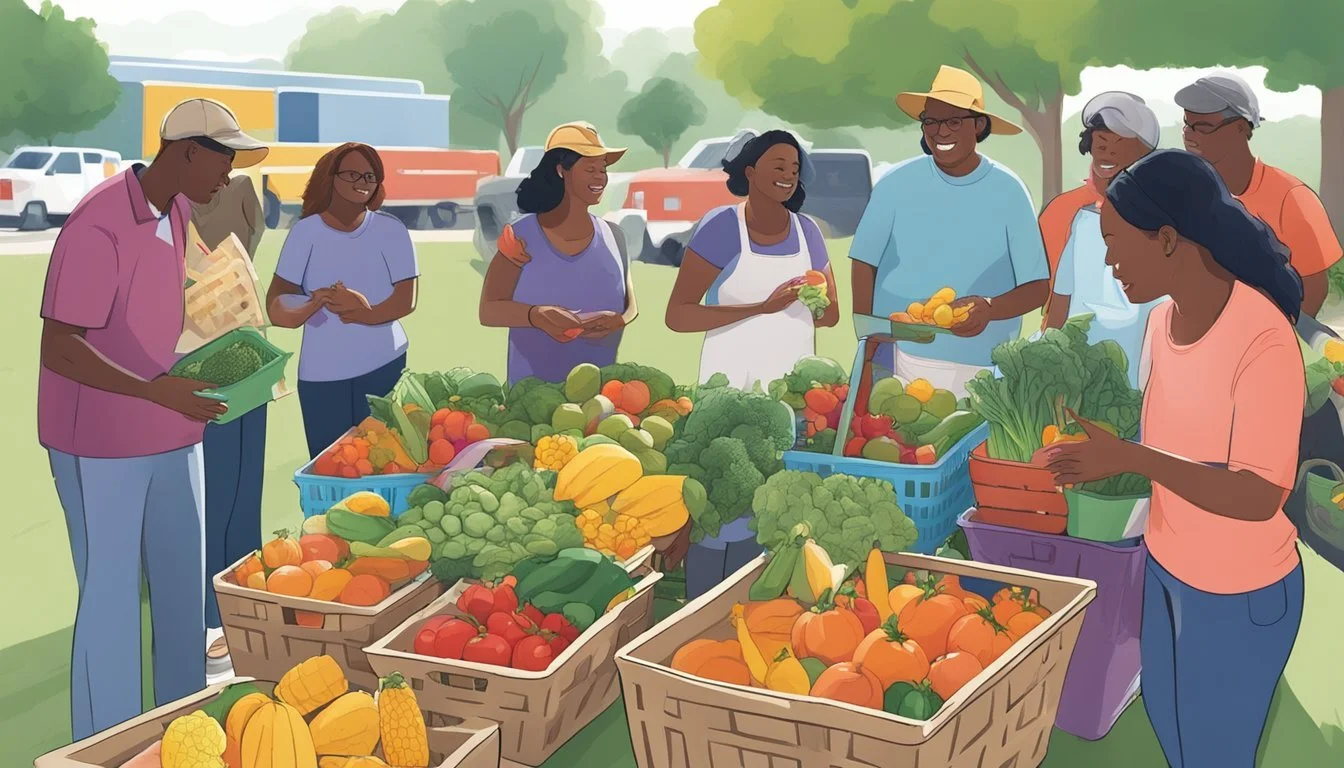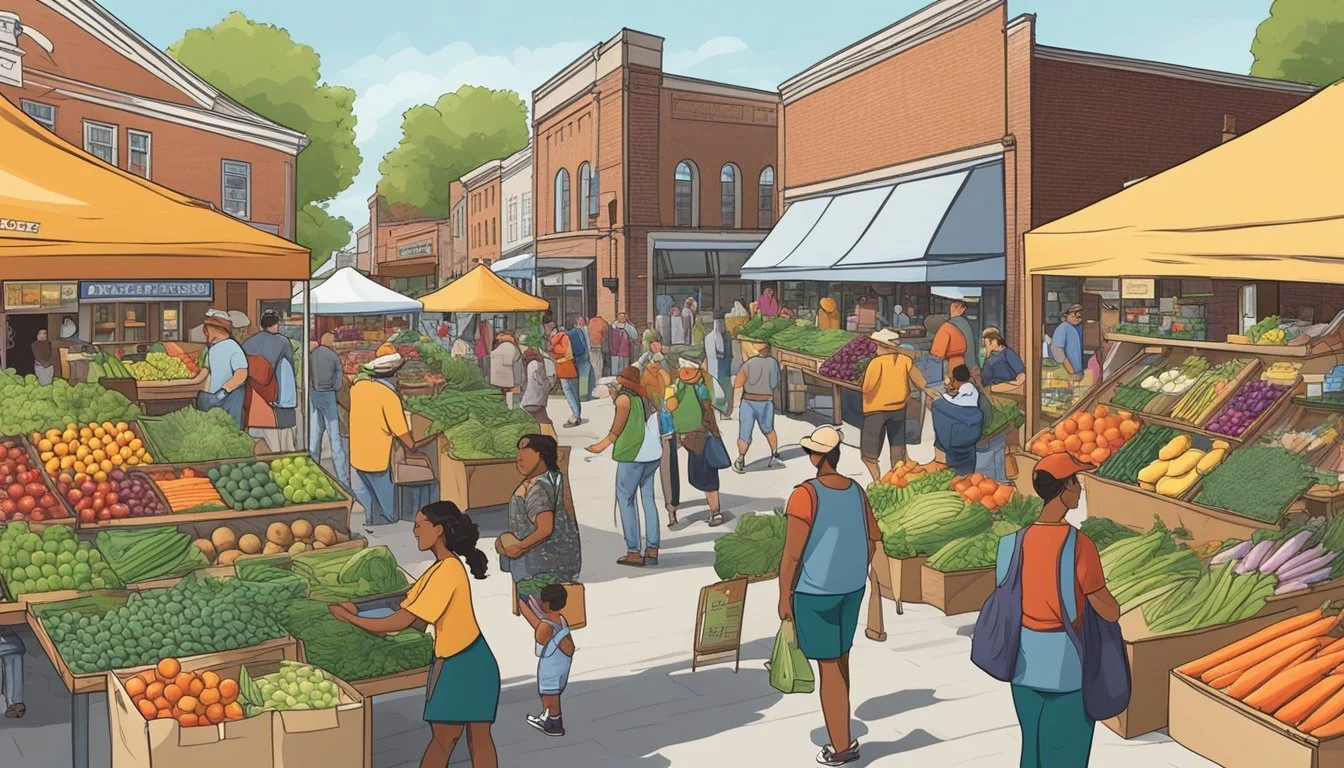Community Supported Agriculture (CSA) in Evansville, IN
A Guide to Local Farm Partnerships
Community Supported Agriculture (CSA) represents a model of food production and distribution that prioritizes local, sustainable agricultural practices. In Evansville, Indiana, this concept has taken root in the form of various CSA projects, connecting residents directly with the fruits of their local land. Such initiatives enable community members to become shareholders—or subscribers—in a farm's harvest, often receiving a portion of the produce throughout the growing season. This model not only supports the local economy but also fosters a deeper connection between consumers and the source of their food.
In Evansville, Seton Harvest stands out as one example of a successful CSA endeavor. Sponsored by the Daughters of Charity of St. Vincent DePaul, Seton Harvest has been providing shareholders with fresh, sustainable produce since 2006, continually expanding its reach within the community. By purchasing shares, families in Evansville receive regular deliveries of fresh, seasonal produce, thus ensuring that they have access to nutritious food while also contributing to the sustainability of local agriculture.
The principles of Community Supported Agriculture resonate with the broader movement towards sustainable living. They hinge on the idea of mutual benefit: consumers enjoy the freshness and nutritional quality of locally grown food, while farmers gain financial security through direct sales. In doing so, CSAs like those operating in Evansville, IN, become a crucial pillar in a self-sustaining food ecosystem, where environmental health, economic viability, and community well-being are intertwined.
History of CSA in Evansville
Evansville, Indiana, has observed the development of Community Supported Agriculture (CSA) as a means to strengthen the bond between local food consumers and growers. Significantly, the emergence of CSAs and the contributions of Seton Harvest mark notable events in Evansville's local agriculture scene.
Emergence of CSAs
Community Supported Agriculture surfaced in Evansville as a grassroots movement aimed at fostering a closer relationship between consumers and their food sources. Initiated by individuals who valued fresh, locally grown produce, these CSAs embarked on a mission to provide residents with seasonal food directly from the farm. In 2019, the city witnessed a renewed interest in local food networks, as CSAs experienced an uptick in memberships, reflecting a growing consumer desire for sustainable and community-centric food options.
Seton Harvest's Role
A notable CSA project in Evansville is Seton Harvest, a community-supported initiative sponsored by the Daughters of Charity. Since its inception, Seton Harvest has been devoted to operating as a non-profit entity, emphasizing ecological stewardship, and extending its reach to various households across the region. Distinguished by the tangible impact on the community's access to fresh produce, Seton Harvest operates with the primary objective to not only distribute seasonal crops to members but also to educate the public on the importance of sustainable agriculture. The project's dedication in 2019 was specifically highlighted by an increase in the variety of crops offered and the engagement of the community in agriculture-related educational programs.
Understanding CSA
Community Supported Agriculture represents a partnership between local farmers and community members that fosters direct access to high-quality, fresh produce. It rests on a foundation of mutual commitment and shared rewards.
CSA Concept and Principles
Community Supported Agriculture (CSA) involves individuals who pledge support to a local farm operation, entering into a membership with the farm. Members buy shares of the farm’s expected harvest in advance, creating a structure where the risks and benefits of food production are shared. CSA fosters direct relationships between farmers and members, with the community often taking on both a legal and spiritual ownership of the farmland. The relationship is built on trust and a communal spirit, as shareholders invest in their local farmer, ensuring the sustainability of the farm's operations.
Benefits for Members and Farmers
Members receive multiple benefits from a CSA membership. They gain access to fresh, seasonal produce straight from their local farm. This also introduces consumers to new varieties of produce and encourages healthier eating habits. Economically, members often find that the cost of produce is less volatile when sourced from a CSA.
From a farmer's perspective, the prepaid CSA memberships provide a more predictable and secure income stream. It enables better planning and resource management, as the farmer has a clearer picture of the demand. This model also reduces marketing costs and allows farmers to dedicate more time to high-quality agricultural practices. Moreover, it creates a built-in market for their products, ensuring stability and sustainability for the local agriculture economy.
Farmers and members form a partnership that is redefining the principles of food production and consumption, strengthening local economies and food systems in the process.
Joining a CSA in Evansville
Residents of Evansville, Indiana, who seek fresh, local, and often organic produce have the option to join a CSA. This supports local farmers and promotes a healthier lifestyle through consuming seasonally available food.
Finding the Right CSA
When selecting a CSA in Evansville, individuals should consider the farm’s growing practices, share sizes, pick-up locations, and type of produce offered. It is also beneficial to know the farm's commitment to organic and sustainable agriculture. Prospective members can:
Visit LocalHarvest.org or similar platforms to find CSA listings in Evansville.
Attend local farmers' markets to meet farmers who offer CSA shares.
Seek recommendations from friends and local food enthusiasts.
One should strive to find a CSA that aligns with their dietary preferences and logistical needs.
Membership Types and Commitment
CSAs in Evansville may offer a variety of share sizes and membership commitments. Members typically purchase a share before the growing season and then receive a portion of the farm’s harvest throughout the season. The types of memberships often found include:
Full-size shares, suitable for larger households.
Small-size shares, intended for individuals or smaller households.
Work shares, where members contribute labor in exchange for produce.
Commitments can range from several weeks to the full growing season, often with options for renewal. Payment plans and up-front payments vary by CSA, with some offering discounts for early sign-ups or full-season commitments. It is important for individuals to understand the terms of membership and any potential risks, such as crop failures.
CSA Product Offerings
Community Supported Agriculture in Evansville, IN, provides shareholders with an array of fresh products. Primarily focused on seasonal produce, offerings may include fruits, vegetables, and on occasion, items like eggs, cheese, and flowers.
Typical CSA Contents
CSA boxes in Evansville typically encompass a variety of vegetables and fruits. A shareholder can expect to find staples such as:
Vegetables: Tomatoes, bell peppers, cucumbers, carrots, and leafy greens like lettuce or spinach.
Fruits: Apples, berries, peaches, or melons, depending on the season.
Added items are sometimes provided to enhance the value of the CSA share:
Eggs: Fresh from the farm, often included in the selection.
Cheese: Locally produced cheeses may be occasionally offered.
Flowers: Seasonal bouquets could be a pleasant addition.
Seasonal Variations in Produce
The content of CSA boxes evolves with the seasons. Here's a snapshot of what shareholders might receive during different times of the year:
Spring: Spring offerings lean towards leafy greens such as arugula, spinach, and spring onions.
| Spring | Summer | Fall | Winter |
|--------|--------|-------|--------|
| Spinach| Tomatoes| Pumpkins | Squashes |
| Spring onions| Bell peppers| Apples | Root vegetables |
| Lettuces| Cucumbers | Pears | Hardy greens |Summer: The CSA boxes become more diverse with a colorful mix of summer squash, tomatoes, cucumbers, and berries.
Fall: This season brings root vegetables, pumpkins, and late-season fruits like apples and pears into the mix.
Winter: Even in the colder months, root vegetables, squashes, and hardy greens are available, although the variety might be less extensive.
Sustainable Practices and Benefits
Community Supported Agriculture (CSA) in Evansville, IN focuses on sustainable practices that benefit both the environment and the local economy.
Environmental Impact
CSAs in Evansville implement sustainable farming techniques that contribute to reducing the carbon footprint of food production. By opting for methods such as crop rotation, natural pest control, and minimal use of chemicals, these farms support biodiversity and soil health. In turn, these practices lead to lower greenhouse gas emissions.
Carbon Footprint: CSA members consume food that has traveled much shorter distances compared to supermarket fare, drastically cutting transportation emissions.
Organic Vegetables: Many CSAs in Evansville prioritize organic production, which avoids the use of synthetic fertilizers and pesticides, reducing soil and water contamination.
Support of Local Economy
Supporting a CSA entails investing in the local community. When residents buy shares of a CSA,
They keep capital within the local economy,
Provide financial security to farmers, and
Foster local job creation.
Local Economy: Money spent on CSAs circulates within Evansville, bolstering other local businesses and services.
Sustainable Farming: Farmers gain up-front capital to invest in their operations, allowing for better planning and stability, which benefits the economic fabric of the community.
Every dollar spent with a CSA reinforces the commitment to sustainable practices that care for the earth and fortify the local economy of Evansville.
Food Quality and Health Benefits
Community Supported Agriculture in Evansville, IN, offers consumers access to produce with higher nutritional value, often employing natural and organic farming methods. This model ensures that members receive the freshest fruits and vegetables, which often translates to better flavor and quality.
Nutritional Advantages
Community Supported Agriculture (CSA) produce is generally harvested within hours to a few days before distribution, resulting in higher levels of freshness. This aspect is crucial since freshness can directly impact the nutritional value of fruits and vegetables: the shorter the time between harvest and consumption, the more nutrients are retained.
Higher vitamin levels: Freshly picked items contain more vitamins than those that have spent time in shipping and on store shelves.
Improved flavor: The flavor of produce is also enhanced when it's picked ripe and consumed soon after harvesting.
All-Natural and Organic Focus
CSAs often emphasize natural and organic farming practices, minimizing or eliminating the need for synthetic pesticides and fertilizers. Consumers in Evansville can thus enjoy produce with an "all-natural" label. Meat, such as 100% grass-fed beef and pastured pork, is also available through CSAs, these animals are usually raised without the use of added hormones.
Organic methods: Many CSA farms in the region use organic methods for crop cultivation, including organic seeds and natural pest control.
Naturally grown: Even when not certified organic, CSA farms typically follow principles of being "naturally grown," which means complying with organic standards, but not pursuing formal certification.
Recipes and Cooking Tips
When members of the Evansville community subscribe to a CSA, they not only support local agriculture but also encounter a diverse range of fresh produce. The following subsections provide efficient strategies for cooking with these ingredients and offer an array of recipes that align with the seasons.
Utilizing CSA Produce
A CSA box arrives filled with an assortment of vegetables and herbs, many of which might be unfamiliar to the recipient. To maximize the use of this produce, members should first identify each item in their share. Subsequently, one can simplify the culinary process by assigning categories to the vegetables: leafy greens, root vegetables, herbs, and so on. This categorization aids in determining which cooking methods suit each vegetable best. For instance, leafy greens like Swiss chard excel in sautéed dishes, (What Wine Pairs Best with Sautéed Dishes) while root vegetables such as kohlrabi are versatile, thriving in both raw and cooked forms. Incorporating new vegetables into daily meals is a fulfilling exploration of textures and flavors that can elevate one's cooking repertoire.
Basil: Pairs well with tomatoes; ideal for pesto or as a fresh garnish.
Cilantro: Complements spicy dishes (What wine goes well with spicy dishes?); perfect in salsas or as a topping for tacos.
Rosemary: Enhances roasted meats and root vegetables; best when used sparingly due to its strong aroma.
For optimal freshness, members should also learn proper storage techniques, such as keeping herbs moist and refrigerated, or storing root vegetables in a cool, dark place.
Seasonal Recipes
Crafting meals around the season's bounty ensures the freshest flavors and aligns with the CSA's offerings. A summer CSA box in Evansville might be brimming with berries and asparagus, while autumn might bring an abundance of squash and apples. Here are tailored recipes that make the best use of such seasonal produce.
Summer Salad:
Mixed greens
Fresh berries
Goat cheese
A light vinaigrette
Autumn Soup:
Roasted squash
Sautéed onions and garlic
Vegetable stock
Thyme and a hint of nutmeg
Both recipes allow the ingredients to shine without needing excessive seasoning or complicated techniques. Cooking tips for these dishes include using a high-quality olive oil for dressings and roasting vegetables at a high temperature to develop deep, caramelized flavors. As CSA members familiarize themselves with the seasonal ingredients, the kitchen becomes a playground for creativity and culinary growth.
Community Engagement and Support
Community Supported Agriculture in Evansville, IN, elevates the traditional food purchasing experience by fostering a deeper sense of connection between residents and local farmers. Events and agritourism further solidify this bond, addressing questions about food sources while enhancing community engagement.
Building a Sense of Community
Community-supported agriculture programs in Evansville are more than just a source of fresh, local produce—they are a catalyst for community cohesion. Each CSA member plays a critical role in supporting local agriculture, creating a network of individuals invested not only in their health but also in the prosperity of their local farmers.
Key components of a strong CSA community include:
Frequent interactions among members and farmers at pick-up sites.
Open communication that encourages questions and transparency about farming practices.
Mutual commitment with residents providing financial support upfront and farmers committing to supplying quality produce.
By participating in CSA, Evansville residents deepen their understanding of the seasons and inherent agricultural cycles, resulting in a shared appreciation for the food on their tables.
CSA Events and Agritourism
CSA events and agritourism activities connect consumers with the very land that feeds them. These events offer hands-on experiences and create an open environment where education meets entertainment.
Types of events hosted by CSAs:
Farm tours: allowing visitors to see where and how their food is grown.
Harvest festivals: celebrating the bounty with activities and farm-fresh foods.
Workshops: such as cooking classes or canning demonstrations that focus on seasonal produce.
These events address common questions regarding farming methods, seasonal availability, and how to integrate CSA produce into everyday cooking. Agritourism also lays a foundation for a resilient local food system by inviting the public to personally engage with agriculture.
Accessible CSA Options
Community Supported Agriculture (CSA) programs in Evansville, Indiana, provide diverse options for community members to access fresh, locally-grown produce. Focusing on affordability and convenience, these programs are designed to reach a broad audience, including low-income households, and offer flexible delivery and distribution methods.
Programs for Low-Income Households
Evansville area CSAs recognize the importance of making fresh produce accessible to all community members, regardless of income. Many CSAs offer sliding scale pricing or subsidized shares for low-income households, ensuring that nutritious food is not a luxury, but a staple for everyone. They may partner with local organizations to facilitate affordability. Participants in these programs can enjoy the benefits of local, seasonal vegetables and support sustainable farming in their community.
Delivery and Distribution
To maximize reach, Evansville CSAs provide a variety of delivery options and distribution points. Members can often choose between picking up their shares at the farm or designated local spots, or they can opt for the convenience of home delivery. Some CSAs serve multiple locations in the Evansville area, including partnering with local businesses to serve as pickup spots, thus enhancing the accessibility of fresh produce to a wider population. This flexibility in distribution embodies the CSA mission to create a more connected and health-conscious community.
Resources and Further Information
When seeking to learn more about Community Supported Agriculture (CSA) in Evansville, Indiana, there are valuable resources available for education and advocacy. These resources are developed by reputable institutions and provide a wealth of knowledge for all interested parties.
Educational Material
The U.S. Department of Agriculture (USDA) is a cornerstone for educational materials on CSA. Interested individuals can access comprehensive data and guides on the USDA's National Agricultural Library. This platform includes statistics, such as the $225 million generated by CSA farms, which is approximately 7.75% of the direct-to-consumer sales.
The Center for Agroecology and Sustainable Food Systems offers in-depth insights into sustainable food systems. One can find a rich array of resources about best practices and models for sustainable farming, which are integral to understanding the CSA approach.
CSA Advocacy and Research
For current research and support of the CSA model, entities advocate for economic viability and ecological sustainability. They publish materials that discuss various aspects of CSA, such as consumer-farmer partnerships and progressive agricultural systems that bolster community and ecological resilience.
Sustainable Food Systems initiatives provide platforms for understanding the environmental benefits of CSA and its role in promoting sustainability. Researchers and advocates present case studies and analysis to support the growth of CSA models that benefit both farmers and consumers alike.
Through these resources, stakeholders in Evansville's CSA scene have access to the information necessary to make informed decisions and contribute to the success of local agriculture.
Legal and Copyright Information
The following section delineates the legal frameworks and copyright norms as they pertain to content usage and site policies for Community Supported Agriculture (CSA) in Evansville, IN.
Content Usage and Rights
Last Updated: March 25, 2024
The content provided on this site related to Community Supported Agriculture (CSA) in Evansville, IN, is the property of the respective authors and organizations. Such content may include texts, images, and other multimedia elements.
Copyright: All rights reserved by the original creators.
Usage: The content is for personal and educational use only unless otherwise specified by the content owner.
Site Policies
The site policies ensure that the interactions and transactions related to CSAs uphold the stringent legal standards.
Users must comply with local and federal agriculture regulations.
Sharing and distribution of material must respect the copyright and intellectual property rights of the original content creators.
Users of this site are obliged to adhere to these guidelines to foster a legal and ethical environment for the exchange and consumption of CSA-related information.










